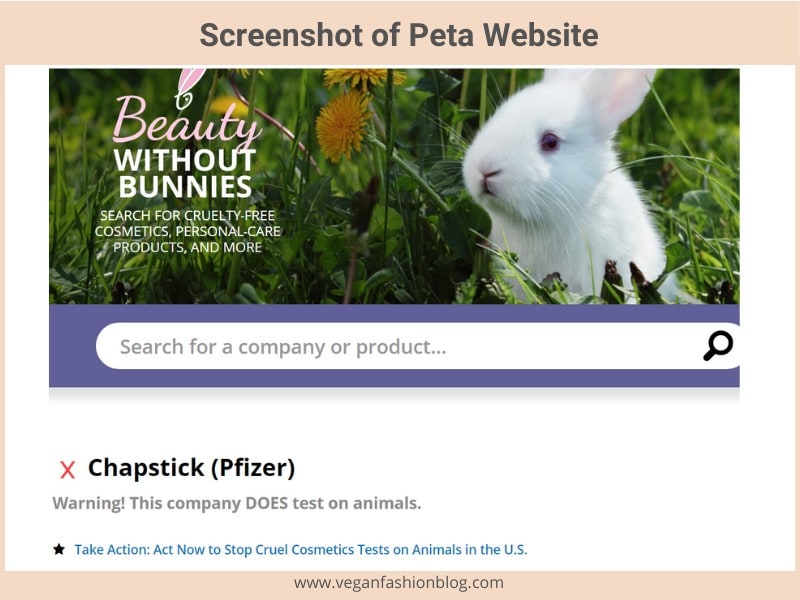Quick Answer: Is Chapstick Cruelty-Free and Vegan?
No, Chapstick is neither cruelty-free nor Vegan. Even though they don’t carry out animal testing in the US, they sell in countries where animal testing is required by law, particularly China. Hence, brands that sell in China are not cruelty-free.
Chapstick is one of the largest manufacturers of lip balm in the US. Chapstick was first introduced in 1880, and its headquarter is in California, USA.
The brand was formerly owned by Pfizer but was recently acquired by GlaxoSmithKline. Their products are available worldwide and are intended to treat issues like chapped or cracked lip.
Is Chapstick Cruelty-Free?
There are two most important requirements that must be met before a brand is considered “cruelty-free”.
The two conditions to this are whether or not the brand tests their products on animals or sell in countries where animal testing is required by law.
Chapstick distributes its product to China and, as such, can’t bypass their strict animal testing policy.
Also, the brand doesn’t have any sort of cruelty-free certification from known authorities like PETA, and they’re missing from Beauty without Bunnies list of cruelty-free brands.
Are Chapstick products tested on Animals?
When they sell in the US, they don’t test their products on animals. This is because animal testing isn’t necessary for cosmetics products in the country.
However, the problem arises when they have to sell in other countries, especially those with strict animal testing policies.
As you probably already know, Chapstick distributes their products worldwide, and China isn’t left out of the equation.
Hence, they need to test their products on animals before they’re allowed to sell in china.
Do they Test Animals when required by the law?
To sell in a country where animal testing is compulsory by law, these brands simply have to comply to continue doing business in the country.
This is the situation with China. In the US, non-animal testing is adopted. They rely on human volunteers for their testing when they need to test their products in the US.
Are Chapstick products sold in China?
Chapstick distributes their products worldwide, and China is included. Remember, Chapstick is one of the most popular lip balm brands in the world, and it would naturally have a huge market base in a place like China.
Does Chapstick have Cruelty Free Certifications?
PETA certification is the seal consumers need to certify that a brand is officially cruelty-free.
This is because the requirement for the certification is to declare that they will do away with any activities that could cause harm to animals. This includes carrying out animal tests and using animal-derivatives.
Chapstick formulation doesn’t comply with this, the reason they’re not on the Beauty without Bunnies’ list of cruelty-free brands.

Is Chapstick Owned by another Company?
Chapstick isn’t an independent company. The brand is owned by GlaxoSmithKline plc. This came after the company acquired Pfizer (the original owners of Chapstick).
Despite venturing into the industry in 2000, GlaxoSmithKline has managed to acquire several top brands in America.
As of 2019, they boast over 99,437 employees spread across several industries like biotechnology, consumer goods, and pharmaceutical.
Aside from Chapstick, GlaxoSmithKline is also the owner of Aquafresh, Sensodyne, and Paradontax. In 2019, the brand was named the sixth-largest pharmaceutical company in the world.
Are Chapstick Products Vegan?
Chapstick isn’t 100% vegan, and in all honesty, only a few lip care brands are. Even those that claim they are vegan are only exhibiting false advertising.
Even worse, most lip care manufacturers fail to disclose a comprehensive list of their ingredients on the pack of their products.
Well, Chapstick claims not to use any sort of animal derivatives, but we’ve noticed a few suspicious ingredients in their product line.
Some of them include lanolin and beeswax. Lanolin is sourced from animal wool, while beeswax is from the honey bee.
Lanolin, in particular, causes several allergic reactions. This includes rashes, swelling, and redness in areas where they’re applied, including the lip.
This is because the animal this substance is derived from is sometimes sprayed with pesticides.
Fortunately, there are other alternatives you can explore if you’re 100% committed to abstaining from brands who harm animals in their production process.
Summary
Chapstick features lanolin heavily in their products. Although they don’t carry out any form of animal testing in the US, they test their products on animals in China.
For these reasons, the Chapstick production process isn’t cruelty-free, and we do not recommend it for individuals who need a 100% vegan brand. We doubt if you would find any among their product line.
To show their indifference to animal cruelty, they don’t have a testing policy on their website. This is a red flag for customers all about kindness to animals.
